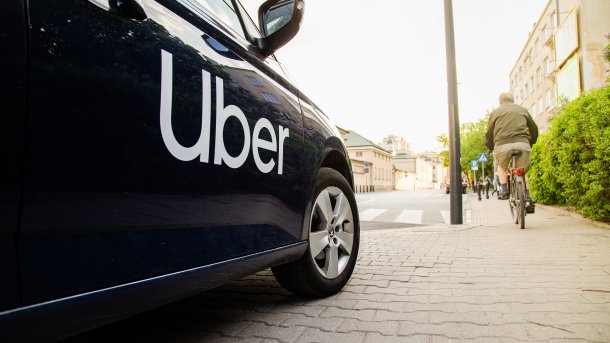Uber Files: Major data leak on questionable methods of the US company
Ten thousands of documents give an insight into Uber's dubious methods when entering the European market. Even high-ranking politicians acted questionably.

(Bild: MOZCO Mateusz Szymanski/Shutterstock.com)
(Hier finden Sie die deutsche Version des Beitrags)
In its attempt to establish itself in Europe, Uber relied, among other things, on questionable cooperations with the former EU Commissioner Neelie Kroes, the future French President Emmanuel Macron and the German FDP politician Otto Fricke. This is what investigative journalists from around the world report, referring to tens of thousands of emails, presentations, invoices and memos from the US ride-hailing company that were leaked to the British Guardian.
According to the report, Kroes already lobbied for Uber when she was prohibited from doing so after leaving the EU Commission. Macron, in turn, may have intervened in favour of Uber with the authorities in Marseille when he was France's economy minister. Fricke is said to have used his political contacts for Uber.
Questionable lobbying
The results of the research coordinated by the International Consortium of Investigative Journalists (ICIJ) have now been published by the Süddeutsche Zeitung, among others, under the keyword Uber Files. According to the report, the documents originated from the years 2013 to 2017, and a total of 124,000 files were involved. They provide an insight into the immense lobbying campaign of the US company, which spent 90 million euros on attempts to exert influence in 2016 alone. According to the documents, Uber representatives met Macron as well as numerous other former or current heads of state and government to promote their own business model. In addition, the documents are said to confirm that the US company may have repeatedly hampered criminal investigations.
Videos by heise
According to the research, Neelie Kroes asked to take a paid job with Uber after her term as EU Commissioner for the Digital Agenda ended in 2014. Even before that, she had defended Uber. Although the Commission had forbidden her to do so, she had organised meetings with Dutch politicians for the US company. Internally, Uber had demanded absolute discretion about Kroes' work. After the end of her waiting period, she was officially hired - with an annual salary of 200,000 US dollars.
Macron, in turn, is said to have assured Uber's chief lobbyists in Europe that he would "personally look at" restricting Uber services in Marseille. At the time, he was Minister of the Economy in France. The restrictions were immediately eased, but it is unclear whether Macron actually exerted any influence. According to the report, a moderately successful lobbying campaign to change the passenger transport law in Germany in favour of Uber was coordinated by Otto Fricke. The FDP politician sat in the Bundestag from 2009 to 2013 and is currently a member of the German parliament again.
Obstacles for investigators
The documents analysed also confirm that Uber has equipped several of its own branches with special software to make investigations more difficult. In the event of a raid, information could be deleted by means of this "kill switch". According to the documents, the software was used in seven countries, including France, Belgium, the Netherlands and Hungary.
The US financial magazine Bloomberg had already reported on such software at the beginning of 2018. Uber has blamed the former CEO and some executives for the misconduct in the media. It was "inexcusable". "The mistakes the company made during that time were thoroughly investigated and rightly attracted worldwide attention years ago," the Süddeutsche Zeitung quoted.
(mho)